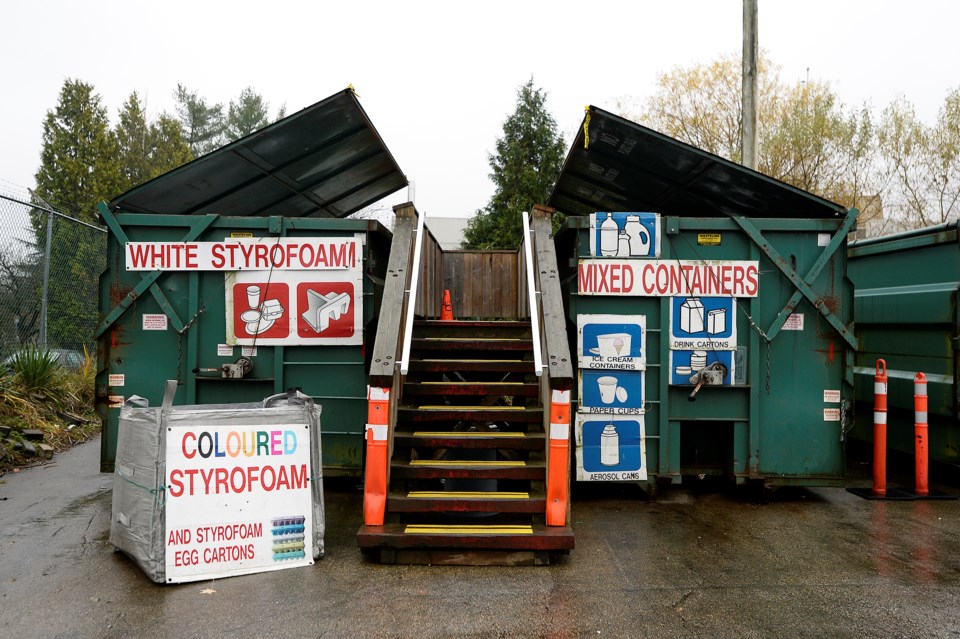New West residents have a chance to channel their passion for recycling into the new Royal City Recycling Champions program.
The program, which is based on content in the Master Recycler Vancouver program, addresses garbage, recycling and organics disposal, and train participants in community outreach, leadership and behaviour change. While participants will learn about recycling, the program also explores how people can reduce and avoid creating waste in the first place.
“We are really excited to engage with New West,” said Daniel Rotman, co-facilitator of Master Recycler Vancouver. “It’s a small, compact and connected city, and I think that offers a lot of opportunities for these people to really put their passion to work in a way that works for city and for the community. Everybody likes recycling, everybody is interested in recycling – we just need to get people aware of how it’s really working so they can direct their passions appropriately.”
Royal City Recycling Champions consists of four evening classes, followed by public outreach. The idea is to teach people how to reduce waste and to get them to share the knowledge they acquire through the program with other community members.
“We will take a look at all the facilities that are present, all the companies that operate within New Westminster to haul and manage recycling,” Rotman said. “Then from there we are going to go a little bit deeper into what does it mean to actually recycle these materials. How does paper get recycled? How does plastic get recycled?”
The online program, which begins Oct. 15 on Zoom, includes four online classes:
Class 1 – New Westminster's Waste System explores the concept of waste, the city’s waste-management system and home waste audits (which will be completed for class three).
Class 2 – It’s All About Materials, Not Waste addresses materials and the way they’re handled. This includesplastic, paper, organics, glass, electronics, metals, hazardous and other EPR (extended producer responsibility) products.
Class 3 – Back to the Future: The Local Circular Economy considers topics such as waste solutions and the circular economy, local organizations and city initiatives, multi-family housing challenges and options, and home waste audit reviews and discussion.
Class 4: Your Turn Now: Community Engagement tackles the principles of community-based social marketing; behavior change tactics, and how they apply to multi-family housing; planning community outreach activities; and a final discussion and wrap-up.
“We end off with the more practical aspect of the course or the program, which is: what are things people can actually do in the community?” Rotman said. “And then we mentor them through that process of figuring out what they want to do, and then also provide mentorship for them in the field for their 20 hours of community outreach.”
Some examples of outreach done through the Master Recycler Vancouver program have included holding recycling events where the participants help guide community members on how to recycle properly, creating small courses for the community (such as how to bake bread in order to reduce bread packaging) and doing demonstrations on topics such as how to make your own cosmetics and cleaners.
“It looks like whatever folks want,” Rotman said of the outreach component. “We try and encourage people to follow their passions.”
Master Recycler and Royal City Recycling Champions programs are places where new ideas may take shape – whether it’s for entrepreneurial or personal activities.
“We are kind of led to believe that recycling is just about putting stuff in the right bin. In reality that is sorting. That’s just sorting your recyclables,” Rotman said. “So what does recycling actually mean? It means making sure that we have a good material stream and that we have something that we can do with that. So quite often we need people to be very creative and understand that, ‘hey we are collecting all this material but nobody is doing anything with it.’ Sometimes that sparks ideas in people’s minds about, ‘hey, maybe I can do this.’ Or maybe I can help collect the materials a little better or maybe I can help people reduce this material in the first place.”
Rotman said Master Recycler Vancouver has had more than 60 grads and 3,000 hours invested in the community since it got underway five years ago.
With the launch of Royal City Recycling Champions, New Westminster becomes the second city in Metro Vancouver to offer a program based on Master Recycler Vancouver. The program is being funded by a grant from the City of New Westminster.
“Master recycling programs in general, we kind of want to bridge gaps. We want to bridge the gap between where our system is at, how our system runs, and what people know about it,” said Rotman, noting recycling systems are transitioning. “As a result, we all come with or are carrying ideas about how our recycling system works and we don’t get an opportunity to update that. What the Royal City Recycling Champions does is provide people with up-to-date information about how the system works, what’s involved and how they can interface with the system in a way that they are passionate about and allows them to make a difference.”
To register for the program (a limited number of spaces are available) go to www.tinyurl.com/RCRChampions. For more information about the program, go to www.royalcityrecyclingchampions.



